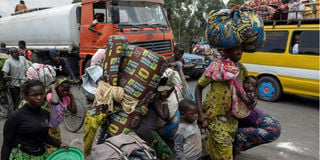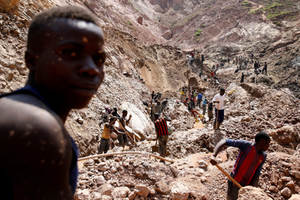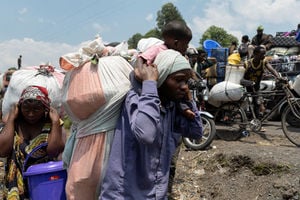
Congolese people carry their belongings as they flee from their villages around Sake in Masisi territory, following clashes between M23 rebels and the Armed Forces of the Democratic Republic of the Congo on February 7, 2024.
Corneille Nangaa wasn’t always known as a rebel but, today, he faces criminal charges in Kinshasa that carry the death penalty if found guilty.
And if his case ends in that kind of tragedy, the origin is Nairobi.
Here is how it all began: On December 14, 2023, Nangaa, a former head of the Congolese electoral commission, showed up at a hotel in Nairobi accompanied by several politicians and representatives of the M23 rebel group.
They formed the Alliance Fleuve Congo (Congo River Alliance), a new political vehicle they said would propel them to topple the government in Kinshasa under President Felix Tshisekedi.
The M23 had been declared a terrorist group in Kinshasa and the government went on to reactivate rarely used laws on the death penalty, seeing it as a tool to dissuade fighters from joining the group, or just compelling enthusiasts to quit it.
On July 24, 2024, Nangaa was formally charged in the military court, alongside 25 others with treason and other crimes, including being members of a proscribed group.
It marked the measure of risk Nangaa had taken – except he and several of his co-defendants weren’t in court. Of the 26, only five have been arrested in Kinshasa.
Authorities accuse them of treason and participation in an insurrectionary movement.
Since April, these charges have been punishable by death, although the death sentence itself hasn’t been implemented in the DRC for the past three decades.
Nangaa’s co-defendants include Nziramakenga Ruzandiza Emmanuel Sultan, alias Sultani Makenga, M23 military commander who has been under UN sanctions since 2012; Col Bernard Byamungu, deputy commander of operations and intelligence of the M23, also under UN sanctions; Bertrand Bisimwa, political leader of the movement; as well as M23 spokesmen Willy Ngoma and Lawrence Kanyuka.
Some civilian political actors have defected from Joseph Kabila's PPRD party, such as Adam Chalwe, Yannick Tshisola, formerly youth leader of the Parti du peuple pour la reconstruction et la démocratie (PPRD), and Henry Maggie, also a former member of the PPRD are involved.
Also in the dock is Jean-Jacques Mamba, a former member of MLC, the party of Deputy Prime Minister Jean-Pierre Bemba, as well as journalist Magloire Paluku.
Members of Nangaa's family – his wife, Yvette Lubanda, and his younger brother Nangaa Baseane – have also been charged in absentia.
On Monday, the military court added Vianney Kazarama, a leading figure in the M23 in 2012, to the list of accused.
In Kinshasa, the trial was broadcasted live on the national broadcaster RTNC.
The few members of the Fleuve Congo alliance, such as Éric Nkuba, who have been detained in the Congolese capital for six months remain defiant.
“I am one of the founders of the Fleuve Congo alliance (AFC),” Nkuba admitted, while praising the rebel movement for its intentions to “unite all the Congolese.”
But he rejected the accusation that Rwanda is supporting the M23, even though several reports by United Nations experts, and several statements by the US, France and the DR Congo affirm that Kigali is providing support to the Congolese rebels.
Instead, Nkuba accused the Congolese army of collaborating with the FDLR, the remnants of fighters accused of having fuelled the Rwandan genocide in 1994.
Region affair
Beyond being a local political issue, whatever happens in court will ring across the region, especially among Congo’s neighbours. Early this year, the Congolese government decided that the death penalty would be immediately applied to crimes deemed threatening to the stability of the state.
A document publicised in April cited treason, espionage, participation in armed gangs, participation in an insurrectionary movement, crimes against humanity, war crimes, desertion to the enemy, genocide, military conspiracy, rebellion resulting in the death of the authority against which the acts of rebellion are committed, as crimes punishable by death.
In Kinshasa, there was a celebration when the case came up. The trial was opened by the Minister for Justice Constant Mutamba, who termed it “historic.”
Nangaa, who hails from North Kivu, where the M23 has conquered several territories, responded by describing the case as a “show trial.”
“It is a Kafkaesque parody worthy of the greatest Nollywood episodes,” he said, referring to the Nigerian movie industry.
Nairobi link
In Nairobi, where Nangaa formally planted his seed of rebellion, authorities were initially indifferent to Congo’s protestations but later attempted to repair the diplomatic falling-out. The resultant tensions still persist.
When Nangaa first announced the rebel coalition, Kinshasa asked Kenya to arrest and deport him. Nairobi declined and President William Ruto later told a TV audience that he had declined the request because it would violate Kenya’s democratic credentials.
“Our position as Kenya is that we are a democratic country. Even the media knows very well that no one asks for permission from the Kenyan government to make a statement of whatever nature,” Dr Ruto argued then.
“DRC wanted to know whether we could arrest those people. I told them, 'Kenya is a democracy. We cannot arrest anybody who has issued a statement. We do not arrest people for making statements, we arrest criminals. If anybody has committed any criminality, we will go out of our way to deal with them,’" the President added.
That characterisation of the Alliance as a mere political expression rather than a criminal outfit angered Kinshasa, which recalled its ambassador in Nairobi, John Nyakeru.
In May, Kenya sent Prime Cabinet Secretary Musalia Mudavadi to deliver a message to President Tshisekedi: an assurance of no intention to destabilise Kinshasa. But the bad blood remains.
Last week, Tshisekedi accused Nairobi of hijacking peace processes and taking sides with Rwanda. Kenya has not responded to the accusation.










